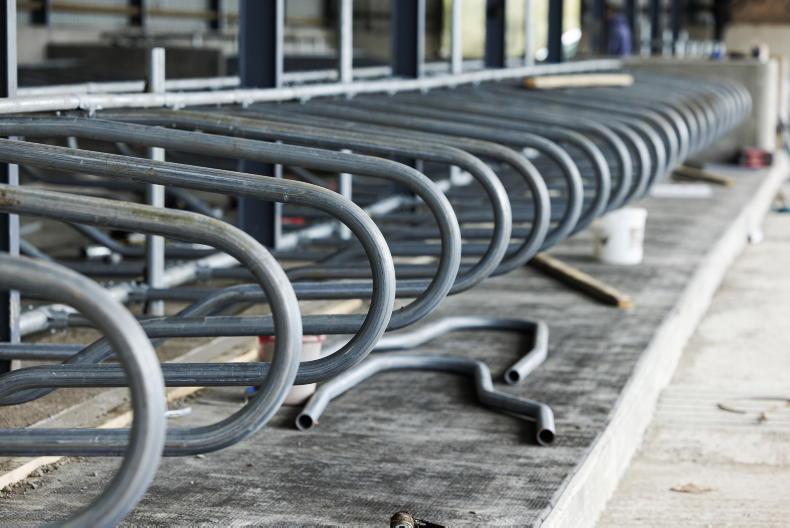Farming can be a tough enough gig without the possibility of being refused a mortgage because your proposed house is near the farm buildings. This is now the reality for one Irish Farmers Journal reader who received planning permission to build a family home. However, after receiving confirmation of planning approval, approaching his bank (PTSB) with a clean credit history, full repayment capacity and a Loan to Value (LTV) of less than 70%, they have been turned down.
Dear reader,
I am sorry to hear you are in this predicament. Firstly, let’s look at the decision. Unfortunately, PTSB or indeed any of the other banking institutions in Ireland do not provide clear guidance on where you should build your house. They provide information on the paperwork you need to obtain a mortgage but even if you tick all of the core boxes, they fail to provide guidance on the potential pitfalls of building your house too near the farm buildings.
This, in my opinion is something that should be highlighted by banks due to the fact that obtaining planning permission in the first place is a long process. To be refused after this based on the proximity of the house to the farm buildings is an unfair rejection having not provided clear guidance in their mortgage planning tips.
Where to go from here?
I would be advising you to appeal the decision through PTSB and their internal appeals process. You have sufficient repayment capacity, the property will have a <70% loan to value, you have offered security and have a good credit rating. So the decision to refuse a mortgage could be considered an unfair and unjust decision. By appealing through the bank’s internal appeal process, it will open the door if refusal is upheld to apply to the Credit Review Office.
The credit reviewer was set up to provide a simple and effective credit review and appeals process for business owners who have been refused credit from participating banks. In this instance, PTSB is a participating. Although you have already proven your repayment capacity, this will further strengthen the case for mortgage approval. The credit reviewer will work directly with you, review your business and form a decision on whether credit should be granted or not. The credit reviewer will also look at the terms and conditions attached to the mortgage and in this instance, the reasoning for refusal.
The credit review fee ranges from €100 to a maximum of €250, depending on the size of the loan. Any loan above €250,000 is €250. This fee is a proportion of the costs with the balance being covered by participating banks. The credit review process is very simple and can be seen on creditreview.ie.
Once you have appealed your decision through your bank’s internal appeal process, that is step 1 complete.
Step 2 is to download and complete the application form detailing all necessary information.
Step 3 is enclosing the correct application fee.
Step 4 is signing your application form and returning to the Credit Review address by email or post.
When filling out the credit review application, it is important to disclose all necessary information and income held including off farm income. The stronger your application, the more chance of the credit review supporting your application. Credit Review is directly in contact with banks and have a very strong presence in the banking network. Although your case does not appear to be a credit issue and is a house location issue, having the support of the credit review office would bolster your application if you were to apply to another banking organisation.
Applying to another bank, should I move everything?
In circumstances like this, where your own bank lets you down, it can often enter your head to move everything to a new bank. It is possible to have loans with more than one bank, although I do acknowledge it is often easier to have them all under one roof. However, in extenuating circumstances as above it may be worth exploring your mortgage options with other banks.
PTSB have the deeds to some of your land and you hold a farm loan with them. If you were to move this loan, there are costs involved. This ranges from banking fees to solicitor fees and it is important to consider the rates that are currently on the market.
If you were to transfer the farm loan to another bank, the land currently held by PTSB would have to be valued by a registered auctioneer and the cost incurred from this can range from €500+VAT to €1,500+VAT. Your new bank may offer to pay for your legal fees in order to have you as a client, but this is not always be the case. The legal fees included in a bank transfer are mainly made up of solicitor fees and the tasks they will carry out are:
1. Request your house deeds on behalf of the new bank from your current bank.
2. Review and advise you on the terms of the loan the new bank is offering you.
3. Witness and process the loan agreement for the new bank. These fees are unavoidable, and it is important to go through the right channels to ensure the transfer is fully legal and will be done with the utmost professionalism.
Having been refused the mortgage from PTSB, you are actually in a strong position to renegotiate with other banks and look for a good rate of interest on both the farm loan and the possible mortgage if you were to move banks completely. One option is to approach banks about the mortgage by itself. The other option is to discuss the possibility of moving all loans, weighing up the professional financial cost of moving against the potential savings. Unfortunately, these are time consuming tasks. However, it could be worth it in the long term.
Banks can be tricky to navigate and there is a lot of red tape involved with the approval processes for both farm and home loans. I would always suggest meeting with your banking coordinator directly if possible. It’s always easier to discuss options in person rather than via email or over the phone.
Jerry O’Neill is a qualified ACCA accountant based in Bandon, Co Cork. If you have a query for Jerry, email advice@farmersjournal.ie










SHARING OPTIONS